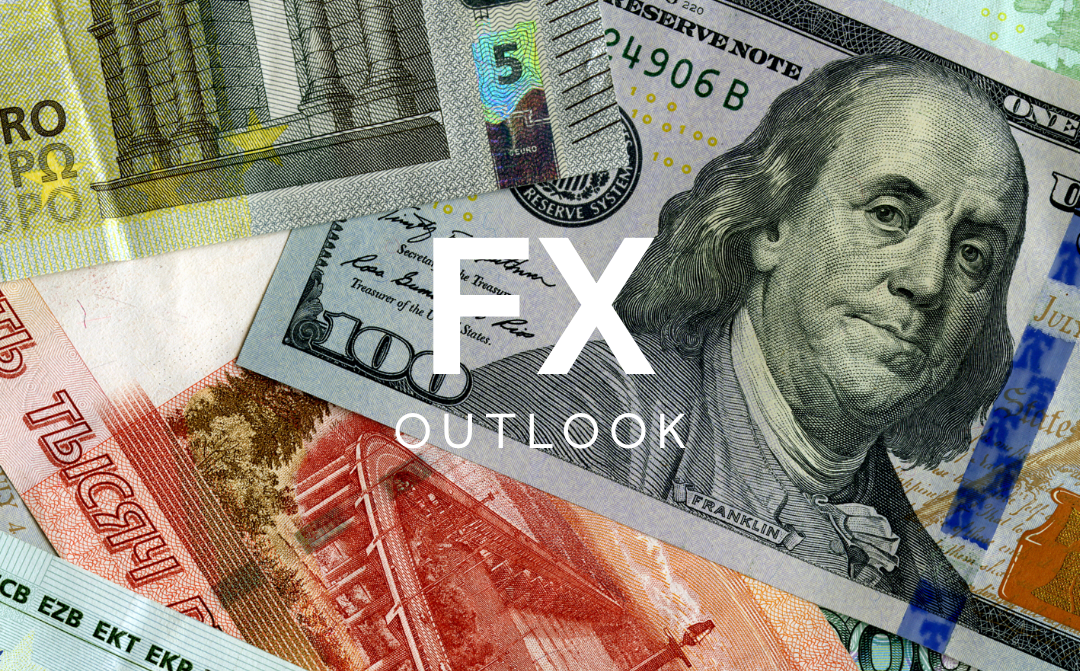23 Oct FX outlook – USD, EUR, GBP, CAD, AUD, NZD

Table of Content
USD
The tension in the Middle East saw investors flock towards precious metals and alternate havens such as the CHF last week. With US yields on the rise, there is a clear hesitancy to approach US treasuries as the haven it has always been, with debt levels surging higher as the cost of debt rises. In addition, Fed policymakers’ uninspired comments and Fed Chair Jay Powell’s dovish remarks put further pressure on the US dollar.
From a data perspective, the USD benefited from strong economic indicators, fueling speculation of prolonged inflation which triggered rate hike sentiments. The September US retail sales figure indicates that higher rates have not slowed consumer spending, as data came out stronger than expected. Other bullish arguments for the dollar included the uptick in Industrial production to 0.3%, and a drop in unemployment claims from 210k to 198k. Having said that, Jerome Powell’s comments echoed those of other Fed policymakers earlier in the week, causing a shift in the market tone. The Fed Chair’s remark suggested that a pause in interest rates might be more appropriate now until there are signs of inflation picking up. Meanwhile, Fed members have also made it clear that they perceive the rise in yields to be driving ever tighter financial conditions, lessening the need for another hike. As such, the dollar index ended up losing -0.48% this week, despite a wider risk-off move in play.
As we enter the new week, investors will continue to keep a close eye on the ongoing conflict in the Middle East. Additionally, there are some key economic drivers such as PMI surveys, GDP figures, and remarks from Powell, which are likely to create some volatility in the US dollar.
EUR
The euro enjoyed a strong week just gone, with the single currency remaining on the front-foot as it benefited from a light economic calendar. The euro currency had a strong start due to the Trade balance of the euro area exceeding estimates and reaching 11.9 billion. Next we saw a surprisingly strong reading across both German and eurozone ZEW economic sentiment, highlighting an optimism within the region that hasn’t been evident before. Inflation updates across the eurozone suggest a difficult situation, increasing the likelihood of further interest rate hikes with the ECB set to meet in the new week. With the US dollar losing ground thanks to increasingly dovish Fed statements, the likes of EURUSD enjoyed a period of strength.
Investors will be keenly watching the economic calendar this week as the Euro is expected to face a series of strong economic indicators. Amidst the current challenging economic situation faced by the bloc, the main focus will be on the ECB’s decision regarding interest rates. Investors are optimistic that the ECB will maintain the current interest rate level, potentially bringing an end to a run of 10-consecutive rate hikes. Whether or not that comes to fruition, the outlook provided by Lagarde in the press conference will be key as we seek to gauge whether rates go from here.
GBP
The pound enjoyed a strong week just gone, with price regaining much of the weakness seen over the prior fortnight. That strength took hold largely across the board, with the pound outperforming havens and non-havens alike. However, questions over whether this will last remain prevalent given the wider trend, with the pound having suffered significant losses over the course of September.
Last week’s inflation report played a key role in this sterling strength story, with CPI remaining flat at 6.7% while core inflation came in above expectations at 6.1%. The recent rise in energy prices raise fears that the UK inflation expectations will turn upwards once again, forcing the BoE into another rate hike. Last week ended with a worrying -0.9% retail sales figure, highlighting the weakening consumption picture in the face of rising household costs. However, there will be a hope that a decline in consumption could in turn help drive down inflation.
Looking ahead, the UK jobs report is belatedly released on Tuesday. With average earnings having come in below expectations (8.1%), there is a hope that we could see cost pressures ease some what for businesses. This week, we are watching for a potential rebound in claimants, while the unemployment rate has been forecast to remain at 4.3% after three-consecutive increases. Also watch out for the latest manufacturing and services PMI surveys, with markets looking for a potential tick higher after months of declines. Any signs of economic strength could be perceived as grounds for optimism at the BoE, with another 2023 rate hike more likely in that case.
CAD
The Bank of Canada’s hawkish sentiment was dampened by a slowdown in inflation, which caused a drop in the value of the Canadian dollar even with a surge in oil prices. With energy prices showing signs of strength, the CAD has been struggling to gather any bullish momentum of late. However, speculation over a potential ground offensive from Israel over the weekend helped drive crude higher, to the benefit of the Canadian dollar.
Last week saw Canadian inflation data released, with the reading of 3.8% falling short of expectations around 4%. This helped bolster confidence that the BoC will maintain their hesitant approach to further tightening. With monthly CPI down to -0.1%, there is grounds for confidence that we will see inflation in the region fall further in the coming months. Meanwhile, the latest retail sales figure of -0.1% served to highlight a slowdown in consumption, which should similarly help drive down inflation going forward.
This week looks set to be dominated by the latest Bank of Canada rate decision, with the BoC likely to keep rates unchanged at 5.00%. This will be followed up immediately by a BOC conference which will give insight into its future policy plans. That forward guidance over future rates will be key as we attempt to gauge whether another rate hike would be likely if prices rise once again. In terms of crude volatility, watch out for events in Israel and its surrounding countries, with a ground offensive potentially pushing WTI higher to the benefit of the Canadian dollar.
AUD
The Australian dollar has been one of the big underperformers last week, with the commodity currency losing ground across the board. This weakness came in the face of falling commodity prices, as concerns over Chinese demand continues to dampen sentiment. Meanwhile, the risk-on profile evident for AUD means that weakness seen throughout global equity markets typically see the likes of AUDUSD and AUDCHF suffer.
Last week saw the new RBSA Governor Bullock highlight the risks they face in trying to bring down Australian inflation, with the heightened risk of a more volatile Middle East raising expectations for energy markets. However, she did note the feeling that the RBA monetary policy has finally started to bite, with consumption slowing down. That should ensure the RBA remains steady for the time being.
This week sees a host of economic data out of Australia, with PMI surveys leading into the key inflation report. With CPI rising to 5.2% last month, another move higher could bring concern for the RBA. Markets are looking for a figure around 5.4%, which highlights the risk of further upside in the event that energy prices push higher once again.
NZD
The New Zealand dollar has been hit hard over the course of the past week, with a batch of better-than-expected Chinese data doing little to help this commodity currency. A slightly weaker GDT dairy price figure saw a second consecutive decline, but prices continue to rise in a meaningful manner. Quarterly New Zealand inflation data saw a spike to 1.8%, although that figure fell short of market expectations around 1.9%. In any case, a three-month gain around that level does highlight resurgent concerns of inflation going forward. From a Chinese perspective, the latest GDP reading of 4.9% was accompanied by better-than-expected retail sales, unemployment rate, and industrial production figures.
Looking ahead, a relatively quiet week sees little by way of Chinese or New Zealand data. Friday’s RBNZ letter of intent does bring a focus on the New Zealand rate outlook, with markets recently pushing back expectations of a rate hike from November 2023 to February 2024. Any signs that they are willing to tighten further over the near-term could help provide relief for NZD.
Disclaimer: This material is a marketing communication and shall not in any case be construed as an investment advice, investment recommendation or presentation of an investment strategy. The marketing communication is prepared without taking into consideration the individual investors personal circumstances, investment experience or current financial situation. Any information contained therein in regardsto past performance or future forecasts does not constitute a reliable indicator of future performance, as circumstances may change over time. Scope Markets shall not accept any responsibility for any losses of investors due to the use and the content of the abovementioned information. Please note that forex trading and trading in other leveraged products involves a significant level of risk and is not suitable for all investors.







